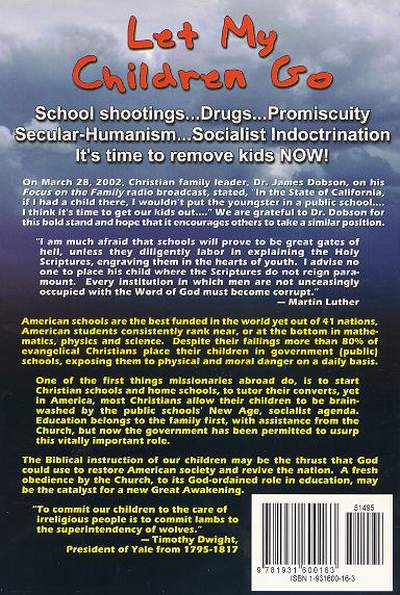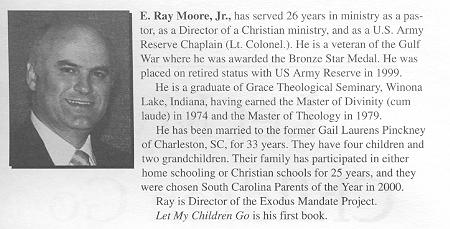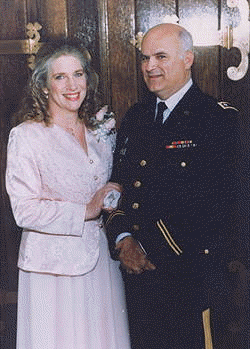Christian Education Awareness Network (CEANet)
Presents
a New Book:
Let My Children Go
Why Parents Must Remove Their
Children From Public Schools NOW
by E. Ray Moore, Jr., Th. M.
ISBN 1-931600-16-3
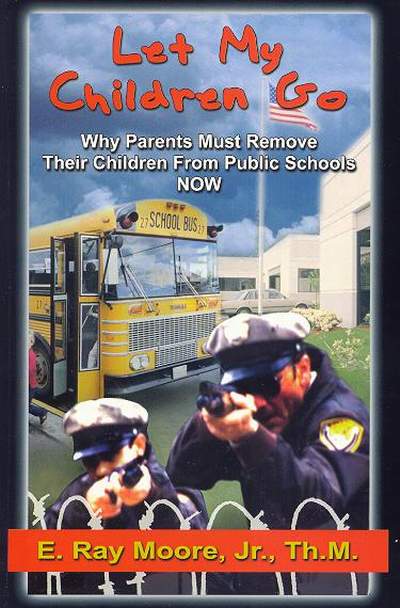
E. Ray Moore, Jr., and his Wife, Gail
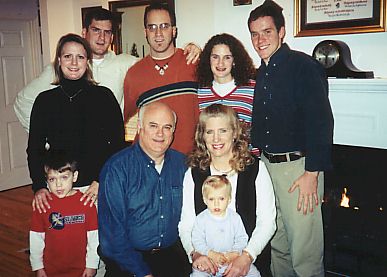
E. Ray Moore Jr., and Family,
Christmas 2002
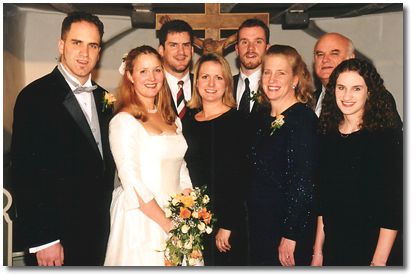
Ray
and Gail Moore and family. Nov. 29 2003 - Wedding of Richard Moore and Simone
Mueller
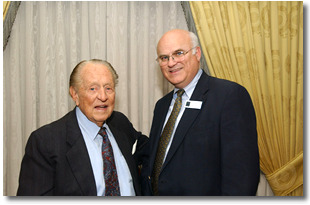
E. Ray Moore visits with Art Linkletter about Exodus
Mandate.
Art Linkletter is a frequent banquet speaker for
Christian schools.
Dedication
In memory of David and Ann Drye who died June 14, 1999. "Saul and Jonathan were beloved and pleasant in their lives, and in their death they were not divided: They were swifter than eagles, they were stronger than lions... How the mighty have fallen in the midst of battle"
(2 Samuel 1:23, 25a).Preface
This book is about hope. Both the nation and the Church are in a moral and spiritual free-fall. Some despair, while others labor on, pray and hope. In Biblical history there have been other dark moments. The family and children were under attack from the Old Testament Pharaoh. The Christian home and family are under attack today.
On March 28, 2002, Christian family leader, Dr. James Dobson, on his Focus on the Family radio broadcast, stated, "In the state of California, if I had a child there, I wouldn’t put the youngster in a public school... I think it’s time to get our kids out..." We are grateful to Dr. Dobson for this bold stand and hope that it encourages others to take a similar position.
Let My Children Go begins as one family’s journey into hope. As the result of providing for our children, home schooling and Christian schools, my wife, Gail and I have experienced "...no greater joy than to hear that our children walk in truth" (3 John 4).
Writers and theologians have gone before and helped shape my worldview on education. Several served as intellectual mentors. I am grateful to many such as Samuel Blumenfeld, Douglas Wilson, R. J. Rushdoony, John Taylor Gatto and Murray Rothbard.
Dr. Raymond and Dorothy Moore inspired my family in our early home-schooling days through their many books. Michael Farris and the staff at Home School Legal Defense Association gave early courage and fortitude to us and many others.
In the development of the Exodus Mandate Project since 1997, I am indebted to numerous friends and coworkers. Board members Richard Cooper, Dr. Henry Jordan, and Treasurer Robert Woodwyk make our continued service possible. Without their support, we couldn’t go forward.
Other coworkers as Rev. and Mrs. (Becky) Joe Morecraft, III; Rev. and Mrs. (Judy) Wayne Rogers; Brig. General and Mrs. (Shady) T. C. Pinckney; and Bobbie Ames gave us early and ongoing encouragement that were on track with this ministry.
Caryl and Pat Matrisciana produced the video Let My Children Go, and have provided constant inspiration. Marshal Fritz has provided counsel and support for the Exodus Mandate Project. He also made important editorial suggestions for this book. Dan Smithwick has also provided advice and research to confirm our central thesis. We thank also the many volunteers for Exodus Mandate.
Dr. Steven Yates provided valuable research and editorial assistance in the preparation of the final manuscript. James Rizzui did the final editing and book design. Christian attorney Michael Peroutka provided financial support and counsel.
Finally, my partner, Gail Moore, was proofreader and supporter. She with our children, has given me a life message that makes this book more than theory.
E. Ray Moore, Jr
Table of Contents
Dedication
Introduction
1. The Family School
2. Get Behind Me, Horace Mann: The Rise and Fall of State-Sponsored Education
3. Toward a Biblical Theology of Education
4. The Basic Errors of State-Sponsored Schools and Why Reform Will Not Work
5. Winning the Hearts and Minds of the Shepherds
6. Minefields on the Road to the Promised Land
7. Civil Disobedience: We Ought to Obey God Rather Than Men
8. The Next Great Awakening
9. Prospects for the Exodus Mandate Project
Epilogue
Source Notes
Introduction
A terrible crisis has developed in the schools to which most Americans entrust their children. On April 20, 1999, two teenage boys walked into their high school bearing lethal weapons and calmly began shooting down their fellow students. Once they had shot and killed 15 people, including a teacher, and wounded several others, they turned their guns on themselves.
Public Schools in Crisis
The killings at Columbine High School in Littleton, Colorado, shocked the conscience of the nation. There were detailed investigations into the lives of the two shooters, Eric Harris and Dylan Klebold, and the so-called "Trenchcoat Mafia" to which they belonged, a loose group of chronic misfits at Columbine.
An examination of their personal websites uncovered a preoccupation with Nazi and occult themes and with mass murder. The two youths had entertained fantasies that went much further than what actually happened. They wanted to blow up their school with everyone in it. Then they wanted -- of all things! -- to go to the Denver Airport, hijack a plane and fly it into the World Trade Center! In this, the last of their death wishes, they provided stunning prescience of the evil that would come to America’s shores two and a half years later.
The Columbine killings had a clear and very ominous, religious dimension. Several of the survivors contended that Harris and Klebold had been singling out students known to be Christians.
Rachel Scott was one example, very likely singled out ahead of time. Another case, one that several survivors mentioned, was that of Cassie Bernall, who hadn’t been a Christian very long. One of the killers asked her point blank, "Do you believe in God?" When she replied, "Yes," without hesitation, he shot her in the face. Christian students were shot down in cold blood for their beliefs. Up until that day, Columbine had seemed to be a model school.
A String of Shootings in Public Schools
But Columbine was only the most dramatic of a string of shootings in public schools that occurred during the 1990’s, a period during which the government and the mass media were assuring Americans that the economy was doing well and that the country was on the right course.
Previous shootings had occurred in Bethel, Alaska; Pearl, Mississippi; West Paducah, Kentucky; Jonesboro, Arkansas; Edinboro, Pennsylvania; Fayetteville, Tennessee; and Springfield, Oregon. Many were killed, many were wounded.
The public schools to which today’s parents send their children are clearly not the type of places they attended themselves. When the Baby Boomers were in high school, discipline problems existed, and students sometimes got caught with marijuana in their lockers. But the idea of a pair of students harboring such intense hatred that they would gun down their fellow classmates would never have occurred to anyone.
However, these shootings are extreme cases of a more general phenomenon: today’s public schools have grown increasingly violent. Many, especially in large, urban areas, have metal detectors on all their entrances.
Gangs have proliferated with rival groups both having armed themselves with guns as well as knives and ready to fight each other on a moment’s notice. Many public schools in the inner-cities have banned gang insignia in an effort to stem the warfare.
Intellectual Deterioration
There is plenty of less frightening testimony that a terrible crisis has developed in public schools. Abundant evidence, assembled from test scores and elsewhere, assures us that today’s public school graduates do not have mastery of basic subjects that earlier generations had.
Students are leaving public high schools in record numbers without having acquired basic writing skills, reading comprehension or mathematical ability. They know little or nothing of this country’s founding or its history. They cannot place major historical figures or events in the right century. They cannot walk up to wall maps and point out significant foreign countries. This intellectual deterioration has spread into public colleges and universities that have admitted more and more unprepared students into college level work. Public universities have had to expand remedial programs that did not even exist 50 years ago. Many colleges have become degree mills, where many students graduate still lacking the basic knowledge needed for intelligent participation in representative government, much less the skills for today’s work place.
A Flawed Philosophy
Tragically, many of these impaired students have adopted a flawed philosophy: They believe themselves entitled to good grades in school and then to a well-paying job. They have little or no interest in matters of learning. And perhaps saddest of all, if they grew up attending church with their parents, they very often stopped church attendance during their college years.
As they enter adulthood, they proceed as if a connection to anything transcending their daily life is irrelevant. Their transcendent aim is obtaining that high-tech job and taking their place in the global economy, something that doesn’t always happen if they haven’t developed the necessary skills.
During the 1990’s, much of the country seemed to have fallen under a kind of collective hypnosis. President Bill Clinton engaged in an extramarital affair with a woman not much older than his daughter, lied under oath to cover it up, and was credibly accused of a number of other sexual indiscretions involving women (one of them a sexual assault).
The majority response seemed to be that Bill Clinton was "personally flawed but politically effective."
Many people remained convinced that all was well because, again, the economy seemed to be doing well. With their 401K accounts surging, the majority wanted no presidential change.
September 11, 2001
Of course, on September 11, 2001, we received the worst possible wake-up call when terrorists who had received their training in this country reduced the twin towers of the World Trade Center and a portion of the Pentagon to rubble, killing over 3,000 people. It was the worst carnage on U.S. soil since the Battle of Antietam.
Our nation’s response to the crisis has been to call for unity and begin what could prove to be a very difficult and very long war against an international terrorist network that is extremely hostile to American values.
As the country has entered this crisis, however, have we thought about where we stand as a nation? We have seen an explosion of signs reading, "God Bless America." But has God blessed America? Does America deserve His blessings? What has moved us from the Columbine killings to the more recent crisis?
Worldviews
Everyone has a worldview. What is a worldview? It is a general perspective on the world around us, a kind of lens through which we see people and events around us whether we are aware of those views or not. It tells us what kind of world this is, who we are, what is of value in life, and what we may hope for. Animals, such as dogs and cats, can simply exist. They do not reflect on the meaning and nature of their existence. But humans cannot thrive without some sense that there is a purpose for their existence. They need "reference points" that place events, other human beings, and the world generally, into a comprehensive framework that shapes their values, especially their moral compass, and guides their beliefs and actions.
Professional philosophers have a wide variety of "--ism" names for a multitude of theories. However, there are really just two basic kinds of worldviews. Worldviews will either be God-centered or man-centered. Christianity, of course, is the God-centered worldview most familiar in our culture.
According to Christianity, the God who revealed Himself to man in the Bible is at the center of creation, and stands prior to everything else: "In the beginning was the Word, and the Word was with God, and the Word was God... All things were made through Him, and without Him nothing was made that was made" (John 1:1, 3).[1] According to Christianity, moreover, man-centered worldviews are futile because man is a fallen being with an innate sinful nature: "for all have sinned and fall short of the glory of God" (Romans 3:23). We cannot save ourselves from this sinful condition, and we cannot build up and maintain a functional social order or any part of it, such as an educational system, unless we acknowledge the centrality of God and His will for our lives.
Then we must personally accept that the only path to true salvation is through Jesus Christ, who paid for our sins on the cross: "For by grace you have been saved through faith, and that not of yourselves; it is the gift of God, not of works, lest anyone should boast" (Ephesians 2:8-9); "For the wages of sin is death, but the gift of God is eternal life in Christ Jesus our Lord." (Romans 6:23); "For God so loved the world that He gave His only begotten Son, that whoever believes in Him should not perish but have everlasting life." (John 3:16).
The Christian’s life is defined by the supernatural, personal relationship the Christian develops with Jesus Christ: "...I have come that they might have life, and that they may have it more abundantly." (John 10:10).
Humanism (or secular humanism) is a generic term for any of a number of man-centered worldviews that try to replace God with man. According to humanists, the universe is self-existing and uncreated; human beings are not the children of God but the product of a long, continuous and very natural, impersonal process.
The Religion of Humanism
Humanists completely reject the supernatural. They have convinced themselves that humanity can dispense with God and with any transcendent source for moral values. But while they have attempted to wrap themselves in the cloak of modern science (in a fashion that would have shocked the architects of the original scientific revolution, such as Isaac Newton, who was a Christian), humanists deceive themselves if they believe they have delivered to the world anything other than an alternative faith, one that is resolutely hostile to Christianity. Occasionally, humanists have offered entirely forthright statements of what they want to do, and where they want to do it. Consider:
"I am convinced that the battle for humankind’s future [the mind] must be waged [and won] in the public school classrooms by teachers who correctly perceive their role as the proselytizers of a new faith: a religion of humanity that recognizes and respects the spark of what theologians call divinity in every human being. These teachers must embody the same selfless dedication as the most rabid fundamentalist preachers, for they will be ministers of another sort, utilizing a classroom instead of a pulpit to convey humanist values in whatever subject they teach, regardless of the education level: preschool, day care or large state university.
"The classroom must and will become an arena of conflict between the old and the new -- the rotting corpse of Christianity, together with all its adjacent evils and misery, and the new faith of humanism, replenishment in its promise of a world in which the never realized Christian ideal of ‘love thy neighbor’ will finally be achieved...
"It will undoubtedly be a long, arduous, painful struggle replete with much sorrow and many tears, but humanism will emerge triumphant. It must if the family of humanity is to survive."[2]
This statement in one of the leading humanist publications in the country, openly acknowledges that secular humanism is a faith, a "religion of humanity," not a science, and promotes a secular humanist invasion and takeover of public schools. Public schools, the authors tells us very openly, are to become the battleground between Christianity and humanism.
Constructing and propagating worldviews is not an idle, intellectual pastime pursued by academics. Clearly, worldview is a foundation. It has an impact on your life. It helps you form the ultimate convictions that you should hold and upon which you should act.
If your worldview is Christian, it will -- or should -- have one set of consequences. If your worldview is humanist, then other consequences will follow. An entire culture can adopt Christianity as its guiding philosophy, and this will have consequences for everyone in it. Or it can embrace man-centered humanism, and different consequences will ensue.
Neither a person nor a culture can simply be "neutral" with regard to worldviews. Both will embrace and live out a God-centered worldview or a man-centered one. If you maintain neutrality, you have already rejected the God-centered worldview and be default have embraced a man-centered one.
The history of modern secular humanism is convoluted, and beyond the scope of this book, but it will be sufficient to say for now (we will expand on this in Chapter Two) that modern secular humanism grew out of the philosophy that originated during the 18th and 19th century Enlightenment. This philosophy either tried to cast doubt on the existence of God or render the whole issue of God’s existence irrelevant to man’s life here on earth.
Link Between Humanism and Evolution
Secular humanism’s advocates had already begun to work under the assumption that the concept of sin was not valid and, instead, that problems stemmed from bad social arrangements. They felt that a different social order would produce a "new human being."
Later, they borrowed from the theory of evolution and its suggestion that living things were continuously improving themselves.
Secular humanists came to see human nature as infinitely improvable, even perfectible. Today they work piecemeal at reforming human institutions -- government, corporations, and especially education -- and have made far more progress institutionalizing their worldview than the average citizen realizes.
As the previous quote spells out plainly, one of the secular humanists’ main instruments for spreading their philosophy was the schools. As we will show, humanist infections in the schools began in Europe and spread to America toward the middle of the 1800’s. The main vehicle for the spread of humanism in America has indeed been the public school system, and began early in our nation’s history.[3]
The consequences are evident for all to see. Secular humanism tries to replace Christianity, but it does not have a credible moral framework that gives meaning and direction to individual human lives. Of course, only a personal relationship with God through Jesus Christ can provide that.
We were not created to be entirely self-sufficient, inner-directed men and women. We were created to follow the one God who is larger than ourselves. This is clear from the fact that those without God invariably follow or serve or identify with something other than themselves -- be it modern science, a political movement, or simply fame and celebrity in this life. The very fact of our inability to thrive without a worldview giving our lives a sense of direction points to this need for a larger framework. But no evidence exists that the secular-humanist vision for modern society is achievable.
The most prominent effort to build up an entire society on an explicitly atheistic foundation, the Marxist Soviet Union, was the most brutal dictatorship in history and a total failure in meeting human needs.
Deterioration of Christian Values
Secular humanists in America have adopted a piecemeal approach to advancing their cause, removing God from the public scene a little at a time. The consequences of our ceasing to be a Christian nation have been devastating, as they have led directly to nihilism, the idea that neither the universe nor our own personal lives have any moral absolutes. This leads to events like the Columbine killings, as well as to a generation of lost young people who fill emptiness in their lives and hearts with drugs, meaningless and dangerous promiscuous sexual encounters, and mindless televised entertainment, much of it graphically violent.
Humanism can also lead to the idea that the government, or the state, can save us if only citizens give it sufficient power, and that a meaningful life can be secured by conforming to its dictates. Government has become, in the eyes of many secular humanists, a kind of secular god.
It began with the public schools, or as we shall shortly be calling them, state-sponsored or state-run schools.
It is clear to nearly everyone, no matter his or her worldview, that public schools are deteriorating. We have seen endless efforts to "reform" the public schools -- ranging from large scale government social engineering programs like Goals 2000 to smaller ones such as tax-funded vouchers and charter schools.
We have seen efforts to "rediscover" morality through character education, a movement many Christians are supporting. While some of these efforts are better than others, all are merely detours on the way to failure. In contrast, our assertion in this book is much bolder than to advocate more "reform."
You’ll receive a complete plan of action as this book progresses. Frankly, it’s the only plan that has a chance of sustainable success. And it will result in a marvelous resurgence of Christian values and worldview that will benefit our culture dramatically.
Christians Are Not Powerless: The Case for a New Paradigm in Christian Education
The concern expressed by many about the loss of Christian principles in our public schools is commendable. But the Christian community as a whole, especially many pastors, is unsure about what to do.
Because of a string of Supreme Court decisions dating back to the 1940’s, it seems clear that a curtain has dropped on any expression of the essence of Christianity -- the birth, life, crucifixion and resurrection of Jesus Christ our Lord and Savior -- in the public schools.[4]
Starting with Everson v. Board of Education in 1947, the first case to dismiss the Bible from American public schools, the Supreme Court has stripped Christian principles and expression of them from the public school system.
Over a dozen cases have been handed down, the most recent being the Santa Fe decision that restricts student prayers at athletic events. While many Christians question the interpretation of the Constitution behind these rulings, they must acknowledge their reality, and accept the fact that the public schools and society at large accept them as valid. Such rulings are now so embedded in Supreme Court jurisprudence as to be practically irreversible, at least in the near future. They have become the worldview and law of the land.
What is important to realize is that the Christian community is not powerless in the face of these rulings. It is one thing to protest, but protests are unlikely to achieve any helpful result. It is one thing to advocate reform in the public schools, but so far, all reforms have failed.
Formulating a Plan of Action
What is needed is a plan that can be translated into action on the part of Christian educators, Christian parents and their pastors.
This book’s purpose is to present that plan. The time has come for Christian parents to abandon the state-sponsored public-school system in favor of home schooling and participation in the development of networks of private, Christian schools, many of them based out of churches. This alone can resurrect the God-centered worldview and place it at the center of the education of our children.
In other words, we want this book to inaugurate a new way for thinking about education in American society, and precipitate a paradigm shift in the thinking of Christians about how they educate their children. This concept, that of a paradigm, is important to understand. The term gained currency following Thomas S. Kuhn’s use of it in one of the most important books of the past half-century, The Structure of Scientific Revolutions.[5] Paradigms are not worldviews; it is more accurate to say that paradigms presuppose worldviews. Paradigms have more to do with concrete problem-solving strategies, actual achievements and plans for action.
The current paradigm for thinking about education in American society, even among the majority of Christians, simply takes for granted the idea that "free" public schools are necessary, and that even if the public schools have some problems those problems can be fixed with the right reforms. There is no room in this paradigm for the possibility that the public schools simply cannot be fixed and ought to be abandoned. Yet this is exactly what we will maintain in this book.
Our current situation and adherence to Biblical principles both call for something much more radical than advocating reform. In the paradigm for Christian education we will develop in this book, public schools -- state-sponsored schools -- cannot be reformed and should be abandoned in favor of home schooling and private Christian schools where a God-centered worldview animates the entire curriculum. According to Scripture, God actually commands us to do this.
Access to the Minds of the Young
Educating the next generation is of crucial importance. The secular humanists, as we will also see very shortly, realized very early in our country’s history the importance of gaining control of the schools in order to gain access to the minds of the young. The creation of the state-sponsored school was central to this effort.
It will be important for Christians to realize that state-sponsored schools were never a component of this country’s original heritage, as defined by the Founding Fathers. The U.S. Constitution never mentions education, and it never authorized the government to set up and run schools. The state-sponsored school system and the acceptance of it by Christian parents is a kind of hypnosis produced by the modern paradigm of education that takes public schools for granted. The time has come to reject this paradigm, reject the secular humanist worldview behind it, and take back our children.
Our Mission as Christian Educators
It is important to stress, then, that we are not trying to reform the public schools. Nor are we trying, in any sense, to "take them over." Our mission as Christian educators must be nothing less than complete independence from the state-sponsored education system. We believe that carrying forth this mission could be an important strategy in reversing our present moral and cultural decline and restoring the moral foundation of this nation.
This is, of course, an ambitious order. It must be approached prayerfully, with God’s Word, the Bible, firmly before us. Most Christians, like most Americans generally, are accustomed to public schools and just consider them part of the landscape of American life. This is because of the dominant paradigm, which takes state-sponsored education for granted as necessary.
Many Christians compartmentalize their faith; that is, they don’t allow Scripture to address certain areas. Still, Scriptural Law is written to be obeyed. One area Christians have historically and tragically compartmentalized has been the education of their children, so we will take a look at specific Biblical instructions (in Deuteronomy, Matthew’s Gospel, and elsewhere) regarding the education of children.
What we will discover is that God assigned responsibility for education to the family, with assistance from the Church. When secular humanism came to be the dominant worldview among the educational intelligentsia of our society and when the necessity of state-sponsored education became the dominant paradigm, even among Christians, the government -- federal, state and local -- was able to usurp the responsibility of the family and the Church. The government, however, has no God-ordained role in education any more than it has a constitutional role.
Abandoning Government Schools
We therefore advocate, with solid Scriptural foundation, that Christians abandon rather than attempt to reform public schools. We believe our call to Christians to leave public schools in favor of home schooling and private Christian schooling is based on Scripture, the historical American constitutional model, sound Bible-based educational philosophy, and also free-market principles. We will not convince Congress with this argument, or even local school boards.
But we will make progress with Christians, helping them to rebuild their worldview and find their way back to Biblical and constitutional thinking which calls for them to remove their children from public schools and begin home schooling or placing them in private Christian schools.
Can we do this? It is a matter of taking the necessary steps and then trusting God.
We have a powerful precedent in Moses. Moses began his career as a man of no special importance until God spoke to him and commanded him to lead the Jewish people out of bondage in Egypt. Instead of fearing the wrath of Pharaoh, he trusted God. He went before Pharaoh and told him, "Let my people go!"
We have our modern Pharaoh: the federal government and the entire system of state-sponsored schooling. Moreover, we are at a crucial juncture in our history because the situation for Christians in public schools is getting progressively worse, and will get worse still.
I believe God is speaking to us today, just as He spoke to Moses.
The only question is, will we follow the path that Moses followed, or will we continue to follow our own paths, compartmentalize our lives, ruin the education of our children and endanger the next generation?
If we follow the lead of Moses, it means removing our children from Pharaoh’s school system and taking them to the Promised Land of private home schooling and Christian schools.
Setting Forth a Foundation
Let My Children Go attempts to set forth the foundation of what we hope will lead to a major paradigm shift in education in American society. Paradigm shifts, as Thomas S. Kuhn explained, are unpredictable.
We cannot claim to have addressed every problem that will come up or answered every question that can be asked.
All of us are fallible, sinful human beings. The most Christians can claim is eternal salvation and a relationship with Jesus Christ. We believe, therefore, that this is what we, as Christian citizens and parents, are commanded to do.
We know that He has spoken to us through His Word regarding the education of Christian children and we had better listen!
The state-sponsored system has become resolutely hostile to Christianity and to this country’s founding principles. Pharaoh’s school system cannot be reformed, and we should not try.
Rather, the time has come to tell our modern-day Pharaoh, which is the public, state-run educational system, Let My Children Go!
Source Notes
1. All Bible passages are from The Holy Bible, New King James Version, (Nashville, Tennessee: Thomas Nelson, Inc.) 1982. Used by permission.
2. The quote appeared in an essay written by a student named John Dunphy. "A Religion For a New Age," The Humanist 43 (1), Jan.-Feb. 1983, p. 26.
3. John Taylor Gatto, The Underground History of American Education (New York: Oxford Village Press, 2000/2001) About this book Michael Farris, former President of the Home School Legal Defense Association, wrote: "This is the most important education book of my lifetime."
4. This and ensuing paragraphs, excepting the discussion of Thomas S. Kuhn and paradigms, consist of a much-updated version of an article originally published in The State (Columbia, S.C.): E. Ray Moore Jr., "Christians Not Powerless Against the Court," August 29, 2000.
5. Chicago: University of Chicago Press, 1962, 1970, 1996.
Click Here to Access ---> Chapter One of Let My Children Go
Click Here to Access --> Review of Let My Children Go
Exodus Mandate Vision Statement:
Exodus Mandate is a Christian ministry to encourage and assist Christian families to leave Pharaoh’s school system (i.e., government schools) for the Promised Land of Christian schools or home schooling. It is our prayer and hope that a fresh obedience by Christian families in educating their children according to Biblical mandates will prove to be a key for the revival of our families, our churches and our nation.
How To Order Let My Children Go
Click Here ==> Let My Children Go, if you would like to order this book at Amazon.com.Title: Let My Children Go
Pages: 352
by E. Ray Moore, Jr., Th. M.
ISBN: 1-931600-16-3
Copyright (c) 2002 by E. Ray Moore, Jr.
Chaplain (Lt. Col.)
U.S. Army Reserve Ret.
All Rights Reserved. Used on CEANet with permission.
Click Here to Return to ==> Let My Children Go CENTRAL
Click Here to Access ==> CEANet Links
Click Here for CEANet ==> Recommended Books & Videos
Click Here to Access the CEANet Home Page ==>
